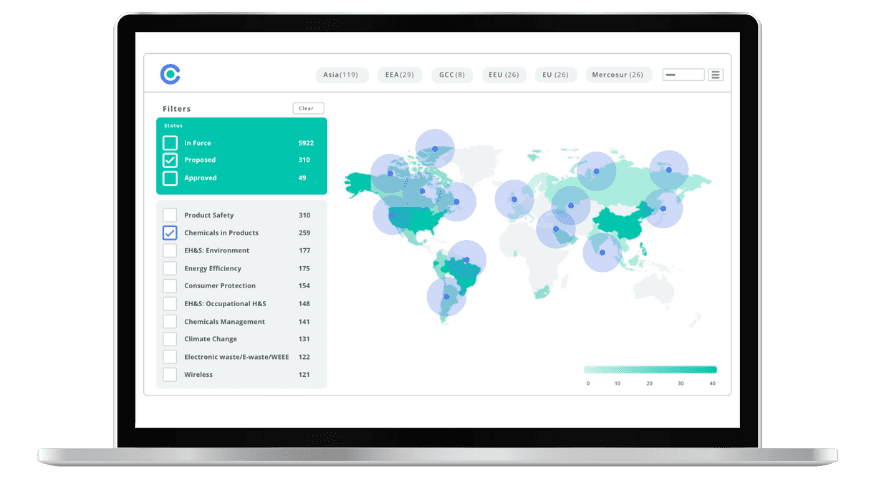
How Latin American Labor Reforms are Redefining Employee Rights and Work Structure in 2025

This blog was originally posted on 26th November, 2025. Further regulatory developments may have occurred after publication. To keep up-to-date with the latest compliance news, sign up to our newsletter.
AUTHORED BY SAMANTHA ANGUIANO, REGULATORY COMPLIANCE SPECIALIST AND LUISA TORO CORREA, REGULATORY COMPLIANCE SPECIALIST, COMPLIANCE & RISKS
Latin America is seeing significant legislative momentum to modernize labor laws, substantially strengthen employee rights, and adapt work structures. Jurisdictions across Latin American regions are moving toward a regional model that emphasizes greater worker protection, well-being, and inclusion. This shift establishes a new, comprehensive baseline for labor standards and imposes stricter compliance duties on employers across the region.
Labor Law Updates: Telework, Work Hours, and Job Security Reforms?
Dominican Republic Sweeping Labor Code Updates
The Dominican Republic significantly expands employer duties, primarily by formalizing and regulating teleworking. Obligations include providing remote work tools and costs, informing staff of surveillance systems, and respecting the right to disconnect outside work hours. Other updates mandate immediate wage payment, internal anti-harassment policies, and an increase in parental leave from two to four days. Employers must also increase monthly reporting to the Ministry of Labour.
Panama is Bolstering Employment Stability
In Panama, a draft law aims to enhance employment stability by proposing to revoke Article 212 of the Labor Code. This change would end the current rule allowing dismissal without compensation for employees with less than two years of service, thus strengthening job security for new hires. The proposal, however, does outline specific exemptions for certain smaller agricultural, manufacturing, and retail businesses. Even with exemptions, employers must provide 30 days’ notice or equivalent compensation upon dismissal.
Brazil, Mexico, Costa Rica & Guatemala Modernize Telework Frameworks and Remote-Work Obligations
Across the region, countries are moving to modernize telework rules and reinforce employer obligations in remote-work arrangements. In Brazil, a proposal would allow temporary workers to perform telework under the existing CLT framework, ensuring equal treatment with other remote employees. Mexico is advancing multiple measures, including requiring employers to promote telework during environmental ozone-alert contingencies in Mexico City and granting workers the right to request up to two days of remote work per week when their duties can be performed digitally, subject to written employer justification if the request is denied.
Costa Rica recently updated its Telework Law to clarify that remote work may be performed both inside and outside the country and to require employers to provide equipment, technology, and appropriate workplace-risk insurance, including extraterritorial coverage when telework occurs abroad. Guatemala is developing its first comprehensive Telework Law, which formally defines telework, establishes multiple modalities, guarantees equal rights for remote and on-site workers, and strengthens employer duties around safe working conditions, privacy, equipment provision, and digital disconnection. Both countries also prioritize telework access for pregnant workers, caregivers, people with disabilities, older adults, and individuals with serious illnesses.
Brazil & Mexico Advance Major Reforms to Working Hours, Shifts, and Rest Periods
Brazil and Mexico are moving forward with extensive reforms that redefine working hours, daily schedules, and rest protections. In Brazil, several initiatives would reduce the standard workweek to 40 or even 36 hours, limit workdays to eight hours, and guarantee a five-day workweek followed by two consecutive days of rest. Additional measures restore mandatory breaks, such as the 15-minute rest before overtime, ensure full payment when rest periods are not granted, and expand protections in special schedules like 12×36. Brazil is also proposing to reinstate commuting time as part of the workday when employees travel to remote or hard-to-access work sites in employer-provided transportation.
Mexico is pursuing similar structural changes. New proposals would reduce maximum daily and weekly hours, establishing a uniform seven-hour limit for daytime, nighttime, and mixed shifts, and lowering night-shift duration due to documented health risks. Mexico is also strengthening daily rest by extending the mandatory break in continuous workdays from 30 minutes to one hour and introducing a 15-minute paid breakfast break counted as working time. Pregnant and breastfeeding workers would receive additional protections through restrictions on night shifts and options to request schedule changes without salary loss.
What New Laws Have Been Introduced for Worker and Family Support Systems?
Colombia Focuses on Family Protection
Three pivotal draft laws in Colombia target single mothers, cancer diagnosis, and expanded parental rights. The Employment Protection of Single Mothers draft creates a highly protected status, requiring labor inspector authorization for dismissal of a single mother and imposing severe penalties (fines up to 5,000 minimum monthly salaries and reinstatement orders) for violations. Employers face an explicit prohibition on discrimination based on parental status and an obligation to offer flexible working arrangements, with large companies mandated to implement a formal flexibility protocol. Separately, a proposal introduces a 7-day paid special leave for workers diagnosed with cancer, applicable across public and private sectors. A third draft proposes a progressive increase in paternity leave from the proposed 5 weeks upon enactment, up to 12 weeks by 2027, and formalizes flexible distribution of parental leave. Finally, a separate proposal mandates five business days of paid leave for marriage or declaration of a marital union, applicable once per employment relationship.
Panama Focuses on Disability Quota & Paternity Leave Expansion
Panama’s legislative agenda includes a significant increase in the disability employment quota. A draft law proposes raising the mandatory quota for private companies with over 50 employees and state institutions to 3% of the workforce. Companies failing to meet this quota must contribute a financial penalty equal to the minimum wage for each unfilled position to a labor development fund. Another proposal seeks to increase standard paternity leave from three to ten business days and grants up to five additional paid days if a newborn requires hospitalization within the first 28 days of life.
Expanding Worker Protections and Family Leave Rights in the Dominican Republic, Puerto Rico, and Peru
In the Dominican Republic, a comprehensive draft law updates the Labor Code by explicitly prohibiting discrimination based on numerous grounds, including sex, gender, and disability. Key obligations include a mandate for employers to implement anti-harassment and violence policies and provide/pay for medical check-ups. New paid leave entitlements are proposed, including five work days for marriage or registered marital union, three days for the death of specified relatives, and four days for a child’s birth. The proposal also formally incorporates teleworking, establishing employer duties like providing equipment, covering costs, and ensuring the worker’s right to digital disconnection. In Puerto Rico, a draft amendment proposes 20 business days of paternity leave and grants both parents the right to request up to six months of remote work following the end of their parental leave, subject to employer authorization. Finally, in Peru, a proposed amendment aims to grant mothers the right to engage in telework from the beginning of pregnancy until their child reaches one year old, making remote work a guaranteed right for this period.
Brazil Expands Leave and Family-Support Rights
Brazil is advancing a set of reforms to broaden paid leave and strengthen family-related protections. The proposals update vacation rules by preventing employers from starting leave on public holidays or weekly rest days and giving priority to parents with school-age children. Short paid leaves would also expand, adding days for blood and platelet donation, birthdays, and preventive breast and cervical cancer exams, as well as allowing unused bereavement leave to be transferred to a co-worker.
Maternity protections would be significantly reinforced. The reforms extend maternity leave to six months, guarantee full leave when newborns are hospitalized, pause leave during prolonged hospitalization, and add extra time for premature or multiple births. Workers would also gain up to 15 days of annual family-care leave, with the option to use telework instead when appropriate, and parents of children with disabilities would receive up to two paid days per month for essential appointments.
Additional measures protect benefits and rest. Employers would be required to maintain food allowances during medical or legally justified leave and to increase meal and rest breaks for long shifts from one hour to two, unless a more favorable agreement applies.
Mexico Advances New Leave Rights, Parental Protections, and Inclusive Benefits
Mexico is considering broad updates to the Federal Labor Law to strengthen leave entitlements and family-support systems. Several proposals expand parental rights, including granting paid leave to lesbian workers when their spouse gives birth, establishing menstrual leave for workers experiencing severe dysmenorrhea, and increasing paternity leave from the current standard to up to 20 paid working days through a gradual schedule. Another initiative would equalize paternity leave with maternity leave by granting fathers 12 weeks of fully paid leave for childbirth, adoption, or guardianship, with protections against dismissal for workers who exercise these rights.
Additional reforms introduce new forms of paid leave. These include a paid day off for blood or platelet donation, paid time off for parents to attend their children’s school events, and new bereavement-leave protections granting five paid days for the death of a close relative, with up to three additional days if travel is required. Workers with children with disabilities would gain one paid leave day per month to attend medical or educational appointments.
Mexico is also expanding protections for pregnant workers by requiring employers to continue paying social security contributions for three months after childbirth when a worker is dismissed during pregnancy, with double compensation if dismissal was discriminatory. Proposals also aim to enhance lactation rights by increasing daily lactation breaks to two one-hour pauses for the first six months and requiring employers to provide fully equipped lactation rooms. New initiatives update vacation rules to give priority to parents during school-holiday periods and grant working minors flexibility to take vacations according to their school schedules.
Costa Rica Strengthens Paternity Leave, Prenatal Protections, and Family-Health Rights
Costa Rica is moving forward with several reforms to reinforce parental rights and family-related leave. A key proposal grants biological fathers a paid paternity leave lasting one month from the birth of a child, aligning rights between public- and private-sector workers and promoting active fatherhood. Another reform would guarantee paid time off for both parents to attend prenatal and postnatal medical appointments and expands dismissal protections during pregnancy and early parenthood.
Costa Rica is also updating its rules on lactation rooms, setting modern standards for workplace facilities, including minimum space requirements, hygiene conditions, refrigeration for milk storage, and an official approval process by the Ministry of Labor. Another proposal creates extensive bereavement-leave protections for pregnancy loss, granting between five days and up to full maternity leave depending on gestational age, with confidentiality safeguards and job-stability guarantees.
Are Latin American Countries Enhancing Child Labor Regulations, Workplace Safety, and Health Protections?
Colombia Implements SIRITI Child Labor Reporting
The Colombian Ministry of Labour has enacted a Resolution, establishing the SIRITI System (System for Identification, Registration and Characterization of Child Labour and its Worst Forms). The regulation broadly defines child labour as any productive activity by a person under 18. The compliance obligation for clients is the direct transfer of reporting duties. Any natural or legal person, domestic or foreign, contracting with an SIRITI-reporting entity for services involving at-risk children must now assume these mandatory reporting obligations. Entities are required to insert an explicit clause assigning this duty into all relevant contracts and agreements, making contractual compliance an immediate priority for all affected firms.
Peru Proposes Expansion of Employer Relocation Obligations Due to Illness
The Peruvian Congress is proposing a key amendment to Article 76 of the Law on Safety and Health at Work. This change aims to expand the employer’s obligation to transfer or relocate a worker whose ability to perform their job is limited by an illness.
Critically, the draft explicitly extends this right to workers suffering from a common illness, going beyond the current coverage for only occupational diseases or work accidents. Employers would be mandated to adopt relocation measures based on the worker’s health profile, the job requirements, and risk factors to ensure the employment relationship continues. Companies must prepare for compliance, as the Ministry of Labor will have a short 30-day window to update regulations upon the law’s passage.
Brazil Strengthens Physical and Psychological Safety Protections
Brazil is advancing multiple reforms focused on both physical safety and mental-health protection in the workplace. One proposal expands the definition of hazardous work to cover workers who use motorcycles, mopeds, scooters, electric bicycles, and other electric mobility vehicles during their job duties, recognizing the heightened risks associated with traffic exposure and vehicle-related accidents. Additional measures target mental well-being: new rules would require employers to provide a mandatory 15-minute mental-health break for workers performing tasks involving high cognitive load or prolonged concentration, and to implement comprehensive mental-health programs. These programs would include identifying psychosocial risks, offering access to psychotherapy and stress-management initiatives, providing psychological support resources, and reinforcing protections against harassment and discrimination.
Mexico Advances Workplace Mental-Health Services and Preventive Health Rights
Mexico is considering several reforms to expand workplace mental-health protections and preventive health benefits. One proposal would require employers to provide on-site psychological care delivered by a specialist in occupational psychology, ensuring workers have access to support for stress, anxiety, depression, and other conditions linked to job demands. Employers would need to designate an appropriate space to offer such services, and similar obligations would apply to public-sector workplaces.
In addition, another initiative would grant a paid day off every six months to women workers aged 25 and older so they can undergo preventive breast and cervical cancer exams. The measure aims to improve early detection rates and reinforce women’s health protections through employer-supported medical access.
What Are the Latest Legal Reforms on Workplace Harassment, Compensation Transparency, and Employee Inclusion in Puerto Rico, Colombia, Panama, Mexico, Brazil, and Chile?
Puerto Rico Proposes New Requirements for Harassment, Pay Transparency, and Payroll Details
Puerto Rico plans to expand anti-harassment laws under a proposed amendment to Law No. 90, 2020, including mental, emotional, and psychological harm. Employers should watch for new harassment types like setting impossible goals, misleading information, and emotional manipulation (“gaslighting”). The upcoming Salary Transparency Act will require employers to disclose minimum employment conditions and full compensation, including benefits, with job postings. An amendment to Law No. 379, 1948, will also enhance payroll transparency, allowing employees to request verification of daily hours worked.
Colombia Enhances Harassment Prevention and Salary Adjustment Mandates
Colombia is strengthening its labor regulations with a Draft Decree aimed at implementing comprehensive measures to prevent and address sexual harassment in the workplace and educational settings. Employers will be required to establish strong gender policies, including a sexual harassment prevention policy, conduct awareness campaigns, create clear reporting procedures, and define a scale of offenses and sanctions. Additionally, employers must prepare and publish a semi-annual report on complaints and sanctions. To protect purchasing power, a separate Draft Law will mandate that wages above the minimum wage be adjusted annually by a percentage no lower than the previous year’s Consumer Price Index (CPI) change. Separately, new rules for apprenticeship contracts are being introduced, including setting maximum work hours for adolescent interns and requiring sexual harassment prevention policies for employers who hire apprentices.
Mandating Well-being and Stress Prevention in the Workplace
Panama is proposing a Bill to mandate well-being at work and stress prevention across all public and private sectors. The obligations are scaled by company size. For instance, large enterprises must implement active breaks every two hours, provide psychological support, establish a well-being policy, and conduct annual psychosocial risk evaluations. Micro and small enterprises have fewer initial requirements, but all will be encouraged toward progressive compliance. The proposed law also prohibits requiring workers to stand for prolonged periods without rest and will introduce a “Healthy Company” certification program with incentives for compliant businesses.
Mexico Boosts Inclusion and Anti-Discrimination Rules
Mexico is moving forward with a broad set of reforms to make workplaces more fair, transparent, and inclusive. To start, lawmakers want to tighten protections against discrimination and harassment, including gender-based misconduct, cyberbullying, and workplace bullying, while raising penalties for employers who allow these behaviors.
At the same time, Mexico is pushing stronger inclusion in hiring. New proposals would require job ads to clearly show salaries and core working conditions, promote the recruitment of people with disabilities (especially in telework roles), and ensure reasonable accommodations. Some initiatives also introduce staffing quotas to guarantee real representation, while others require employers to adjust working conditions for workers aged 60 and over.
Additional reforms focus specifically on women and other vulnerable groups. These include granting up to ten paid days of leave for women experiencing gender-based violence, strengthening protections for LGBTQ+ workers, and banning discrimination tied to Indigenous or Afro-Mexican languages, clothing, or cultural expressions.
Brazil Introduces New Protections for Indigenous Workers
Brazil is moving to expand workplace protections for Indigenous workers through a proposal that creates a dedicated chapter in labor legislation. The reform guarantees equal opportunities, prohibits discrimination based on ethnic identity, and requires employers to provide culturally appropriate information on labor rights. The measure seeks to strengthen access to fair employment while ensuring that Indigenous workers receive protections aligned with their cultural and linguistic contexts.
Chile Advances Age-Inclusion Requirements for Workers Over 50
Chile is proposing mandatory hiring quotas to promote the inclusion of workers aged 50 and older. Companies with at least 50 employees would need to ensure that 10% of their workforce is over 50, while those with 200 or more employees must meet a 25% quota. Employers would also be required to file annual inclusion reports and adapt working conditions—including ergonomics, schedules, and safety measures—to support older employees. The initiative includes protections against discriminatory layoffs and would take effect 24 months after enactment.
What Are the Recent Reforms in Brazil and Mexico on Employer Liability, Training, and Fair Hiring?
Brazil Strengthens Employer Liability, Contract Governance, and Disciplinary Standards
Brazil is advancing a coordinated set of reforms that expand employer obligations across workplace safety, contract administration, and disciplinary procedures. A central proposal would establish employer liability when a worker’s suicide or suicide attempt is linked to work-related factors, clarifying that responsibility applies when such cases stem from harassment or psychosocial risks, even if the incident occurs off-site.
In parallel, Brazil is updating its employment-contract framework. The reforms would allow intermittent contracts to include an optional inactivity allowance during periods without service provision and enable fixed-term contracts to incorporate a projected end date used exclusively for calculating termination compensation.
Additionally, the government seeks to formalize progressive disciplinary measures by requiring employers to apply graduated actions—such as warnings or suspensions—before imposing dismissal for cause, except in cases involving serious misconduct. Collectively, these changes reinforce employer accountability and modernize the compliance architecture governing employment relationships.
Brazil & Mexico Reinforce Training Obligations and Skills-Development Alignment
Brazil and Mexico are also moving forward with initiatives that strengthen employer responsibilities around worker training and professional development. In Brazil, a proposal seems to allow employers and workers to agree on a minimum period of continued employment when the employer finances professional, technical, or higher-education programs—supporting return on investment and long-term skills retention.
Mexico is taking a broader structural approach by proposing a national digital platform that would centralize all procedures related to worker training and competency certification. Employers, training institutions, and workers would be required to upload plans, programs, and records, ensuring traceability and transparency. A complementary initiative would obligate employers to prioritize the hiring of workers with official technical certifications and coordinate with authorities to align training efforts with regional labor-market needs. Together, these reforms strengthen workforce development ecosystems and expand employer duties in upskilling.
Mexico Moves to Prohibit Blacklisting and Reinforce Fair-Hiring Standards
Mexico is also moving to a new proposal to amend Article 133 of the Federal Labor Law that would explicitly prohibit the use of “labor blacklists. These informal databases may contain worker information that can trigger direct or indirect discrimination, restrict access to employment, or limit retention and promotion opportunities. The measure reinforces fair-hiring practices by clarifying that decisions must be based on skills, merit, and job-related criteria, while protecting worker dignity, privacy, and equal access to employment opportunities.
Stay Ahead Of Regulatory Changes
Want to stay ahead of these regulatory developments? Accelerate your ability to achieve, maintain & expand market access for all products in global markets with C2P – your key to unlocking market access, trusted by more than 300 of the world’s leading brands.
C2P is an enterprise SaaS platform providing everything you need in one place to achieve your business objectives by proving compliance in over 195 countries.
C2P is purpose-built to be tailored to your specific needs with comprehensive capabilities that enable enterprise-wide management of regulations, standards, requirements and evidence.
Add-on packages help accelerate market access through use-case-specific solutions, global regulatory content, a global team of subject matter experts and professional services.
- Accelerate time-to-market for products
- Reduce non-compliance risks that impact your ability to meet business goals and cause reputational damage
- Enable business continuity by digitizing your compliance process and building corporate memory
- Improve efficiency and enable your team to focus on business critical initiatives rather than manual tasks
- Save time with access to Compliance & Risks’ extensive Knowledge Partner network

Cutting Through the Chaos: A 2025-2026 Survival Guide to ESG, Sustainability & Product Compliance
Unpack the latest regulatory developments in 2025, gain practical insights, and learn what’s coming next in 2026!
Whether you’re grappling with deadlines or planning for future compliance, join us for a roadmap to navigate the challenges and opportunities ahead.



